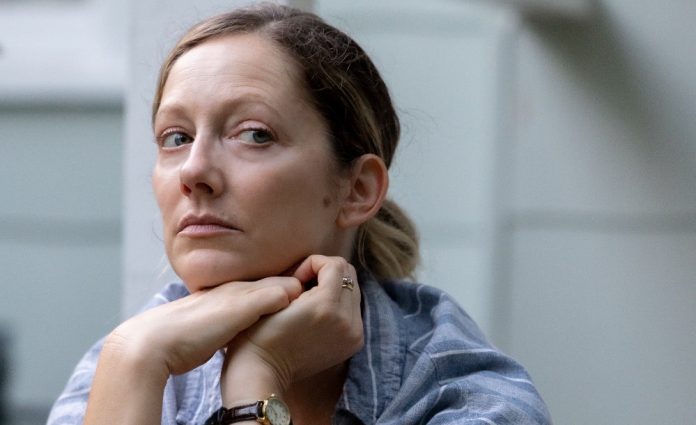It’s somewhat ironic that the very same week that Michael Shannon is reprising his Man of Steel role as General Zod in The Flash, which is one of this summer’s biggest blockbusters, he’s also premiering his feature directorial debut — the small indie drama Eric Larue — at the annual Tribeca Festival.
Based on a play written 20 years ago by Brett Neveu, Shannon’s film stars Judy Greer as Janice, the mother of a young man (the title character) who killed some of his high school classmates who had bullied him. Janice’s husband (Alexander Skarsgård) has turned to the church for solace, leaving Janice to deal with her own anger while interacting with a community that still very much blames her for the actions of her son.
Though decades have passed since Neveu wrote the play, the story isn’t any less relevant or timely because, sadly, school shootings continue to be an all-too-frequent occurrence in our gun-obsessed country. In making Eric Larue, Shannon turned to many of the actors he had previously worked with as well as close personal friends (including his wife, Kate Arrington, who is also an actor) to round out the cast of this relatively low-budget indie, which deals with many complex emotions our country has been forced to grapple with — with no end in sight.
Above the Line hopped on Zoom last week before the Tribeca Festival premiere of Eric Larue to chat with Shannon, who told us why the time was right for him to step behind the camera and why he cast Judy Greer, an actress known primarily for her comedic talent, as the film’s dramatic lead.
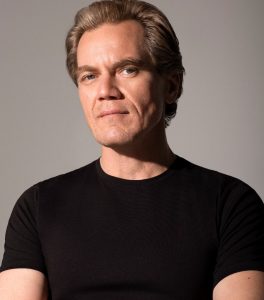
Above the Line: It’s unusual for festival films to have robust Wikipedia pages, but there’s a lot of information out there about Eric Larue. From what I gathered, this was something Brett wrote for the Steppenwolf Theater about 20 years ago. Had you directed it as a stage piece, or was that play just something put on during your tenure there?
Michael Shannon: It wasn’t at Steppenwolf, actually; it was at a theatre company I’m a member of called A Red Orchid (like the flower) Theatre in 2002. It’s a tiny theatre company I’ve been with for about 30 years in Chicago. The play right before Eric Larue was actually Bug. We were doing Bug when 9/11 happened, and then the play after that was Eric Larue. I wasn’t in it, I had nothing to do with it, I didn’t direct it. I just watched it quite a few times, because I was very captivated by it.
And then, I didn’t hear hide nor hair of it for years and years and years. In 2018, I directed another play that Brett had written, a modern adaptation of Enemy of the People called Traitor. He handed me the screenplay for Eric Larue on Closing Night of that production, and asked me to read it, just to hear my thoughts. When I read it, I thought something that I thought I would never think in my life — I thought, “I want to direct this.”
I was categorically against directing films because it always seemed like a royal pain in the ass to me. I always had the utmost respect for film directors. It just seemed like too much responsibility, but when I read this script, I just felt it in my bones. I saw it, and I didn’t want anyone else to do it, because I thought they would mess it up. So that’s it.
ATL: Fair enough. I’ve just always been interested in actors who step behind the camera to direct because it can take a year or much longer. What was it about Eric Larue that made you want to take time off from acting and throw yourself into making it as a movie?
Shannon: [Well], you don’t make any money, that’s for sure. You lose money. Surprisingly, it was a very fast process once it started. I hooked up with Sarah Green, a producer that I met through Jeff [Nichols], who was producing Jeff’s movies, and she very graciously agreed to produce it. This was right around when COVID was starting, so we kind of got shut down for a couple of years, but once it was feasible to go forward, Sarah got the financing very quickly. It all went very quickly. It was actually probably less than a year. From prep to the final [film], it was really only maybe six or seven months, so it was remarkably quick. I didn’t really lose that much time [acting], but there are a lot of reasons [I decided to direct]. It’s hard to boil it down to one reason.
I’d say, first and foremost, I’m just a big fan of Brett’s writing. I feel like Brett has a very unique style. I can always tell when I’m watching or reading or listening to a Brett Neveu play. There’s nobody else quite like him. I love the way his mind works, and I love what he’s preoccupied with — what he thinks is important. This project, in particular, just really spoke to me, I think, largely because it’s so personal to Brett [and] his past — not that he has anybody in his past that’s committed a school shooting, but a lot of the details and the characters in this film are based on experiences that he had growing up in the Midwest.
I’m always very turned on by that — when people are mining their own experience to tell a story, as opposed to trying to make something up. I think the film is very all-encompassing in its reach. It’s not just about a school shooting. I really feel like it’s about our country, and how confusing it is to live in America. I think America is a very confusing place, and I think this film encapsulates that quite brilliantly. Or the script did… so that’s what drew me to it.
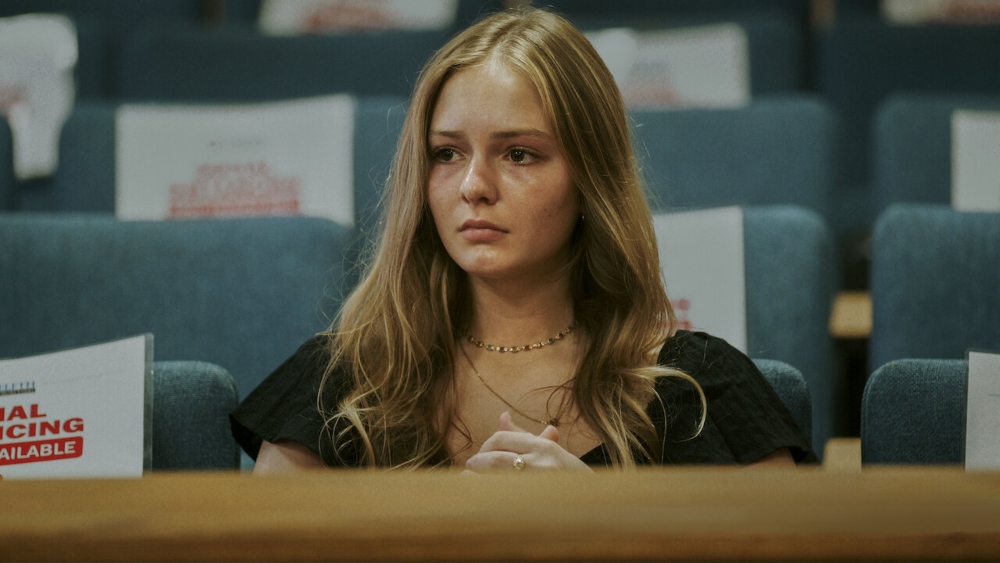
ATL: I assume Brett originally wrote it as a response to Columbine, but now, 20 years later, school shootings have become this horrible, everyday occurrence — and the problem is just getting worse.
Shannon: It just remains relevant, which is creepy and sad and unfortunate. Here’s something that’ll blow your mind: He actually wrote it before Columbine, so that’s even spookier. Columbine happened not too long after he wrote it. Again, going back to the word I used — “confusion.” It’s so confusing that a play like this is still relevant 20 years later. Most of the time, if you have a problem, you try and find a solution. If you scratch yourself and you’re bleeding, you go and get a bandaid and some Neosporin, and you try and heal yourself. But there’s something about this country that has no idea how to heal itself. It’s repeatedly traumatized, yet there doesn’t seem to be any medic in the house whatsoever. We just keep getting hurt and not healing, and I wonder why that is. I think this film wonders the same thing.
ATL: I have to ask about Judy Greer. She’s obviously an amazingly talented actress who we’ve seen excel in comedy, but she really surprises with her dramatic turn here. Did you know she had this performance in her beforehand? Had the two of you worked together before Eric Larue?
Shannon: I worked with Judy on a film called Pottersville, which was a comedy that a friend of mine wrote — Dan Meyer — and another friend of mine directed — Seth Henrikson. We had a blast working together. I hadn’t met her before Pottersville. I didn’t know her prior to that, but making that film, I quickly realized, ‘Oh, wow. This is one of my favorite people to work with.’ [She was] so smart and so fun, and so present.
I knew when I was trying to find a Janice, that I did not want to go with the… for lack of a better term… usual suspects — the people that you would think of for a dramatic leading female role. Because frankly, I’m tired of a lot of them. I wanted somebody to surprise me. I wanted somebody to bring some complexity to it, and Judy is actually a very complex person. Even though she’s known for making people laugh or entertaining people, she’s a deep thinker, and she’s very concerned about the world. So to me, it was just a no-brainer to get her in the part.
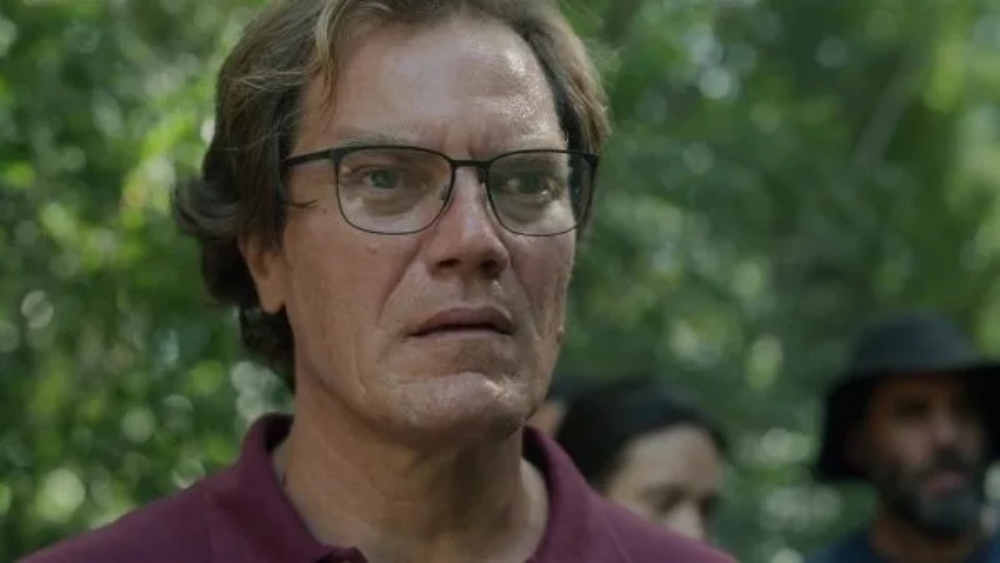
ATL: I spoke to Jason Bateman for the first movie he directed prior to Ozark, and one of the things he told me is that he likes acting in the things he directs since he can direct the other actors by using his skills as an actor. Did you ever consider playing a role in Eric Larue yourself — maybe the role played by Tracy Letts in the play, or perhaps a different one altogether?
Shannon: No, no, I did not want to be in it at all. I was quite happy just to direct. I can’t really imagine… well, first of all, I’m not sure I’ll ever direct another movie again, but if I do, I’m pretty sure I won’t act in it. I’m not saying I’m right or anything, but to me, they’re so different — directing and acting. I look at directing as taking care of people, and acting, unfortunately, a lot of times, is taking care of yourself.
I just want to be open and present for other people, and I don’t want to be thinking about myself, or my performance or whatever. I can’t imagine doing that. Now, having said that, I also said I couldn’t imagine directing a film, so maybe someday I’ll change my mind. For the time being, they don’t mix for me. They’re oil and water.
ATL: I think I read that Brett was on set the whole time you were making this film, so how was it working with him as a screenwriter on a movie as opposed to as a playwright behind a play you’re directing?
Shannon: Brett’s like my brother. It doesn’t really matter whether it’s a play or a screenplay or whatever; I just wanted him there because I just have the utmost respect for him, and I wanted him to [be able to offer] input at any point. I wanted him to have access to the actors [and] access to me. What he wrote is so incredibly brave and important that it would break my heart if I misstepped at all with it, or screwed it up.
I wanted him to be around, and I wanted him to be able to tip the scales in any which direction if he felt the need to, which he really didn’t most of the time, which made me happy. It meant that my instincts were right — that I was suitable to direct the movie. Just on the off-chance that I was wildly misguided in my interpretation, I wanted him to have the opportunity to tell me that.
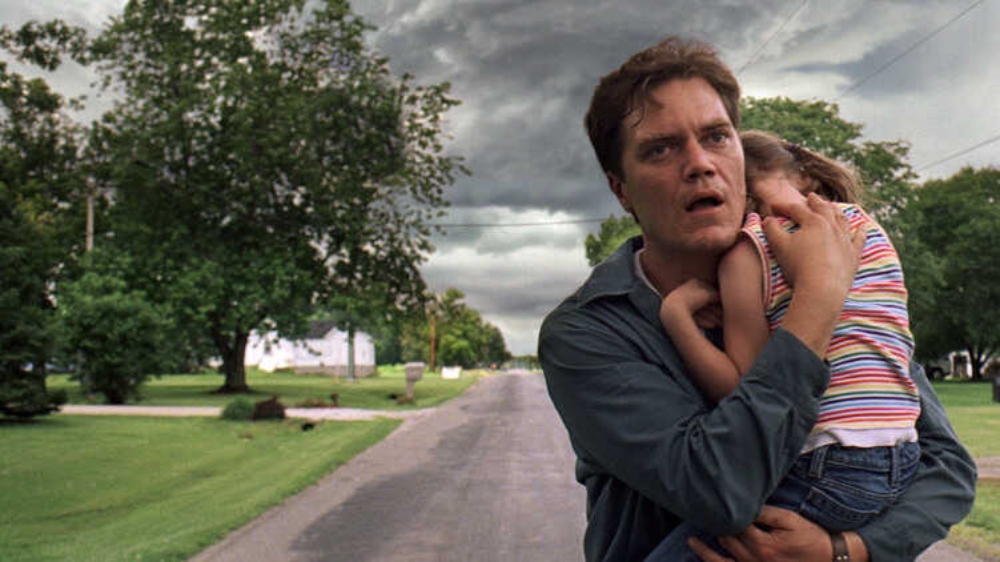
ATL: Can you talk about putting together the rest of the cast around Judy? I hadn’t even realized that Paul Sparks and Annie Parisse were married until after I watched the movie and saw their scene together. Can you talk about getting them to do the movie, and also Tracy Letts, who you’ve known for a long time and appears in a small role?
Shannon: By and large, these are people that I’ve worked with and have friendships with. Judy… Alex [Skarsgård] I worked with on Little Drummer Girl, and we became great friends. He’s just one of the sweetest people on Earth, and he was so sweet to come and do this movie because he and his partner had just had a baby, and it was a big decision for him to come and do it, but he did it in eight days, and I hardly had to give him a note. He just knew exactly what to do.
Tracy is one of my oldest and dearest friends, as is Paul. Annie I know through Paul, and Kate [Arrington], obviously, I’m married to. I had met Allison [Pill], but I hadn’t actually worked with her, but boy, she just knocked it out of the park. I was just thrilled with what she did. I got very lucky. None of these people got rich doing this movie, obviously, and it was a very quick shoot. Pretty much every day of the shoot, we were done early, because everybody was just killing it.
I was then able to use some actors from my theatre company in Chicago. Mierka Girten, who plays Janice’s boss, Sheila, and Larry Grimm, who plays her other boss at work, Jack, and then, Jen Engstrom, who plays Laura Gates, who is the mother that Alex’s character, Ron, interacts with at the church. That made me very happy because Jen Engstrom actually was in the original production of Eric Larue at Red Orchid, but she played Stephanie, the part that Annie plays in the movie, and Laura Gates, the part that Jen plays in the movie, wasn’t actually in the play. It’s worth noting that Brett did an amazing job of opening the play up. The play is much more contained and minimal, and Brett added characters and locations, and he did it very skillfully, I think, to show the community at large, and give it a little more air.
ATL: Before I let you go, a big part of directing a movie is finding the right heads of department and other key collaborators, whether it’s your editor or DP or the person doing the music. Did you have a lot of the Eric Larue crew in your Rolodex from other films you’d worked on, or did you have to look for crew people in the area where you shot?
Shannon: My MVP really was Chad Keith, my production designer. He was phenomenal. I worked with him a lot through Jeff Nichols. Originally, we were supposed to shoot the movie in Arkansas, but we moved it to North Carolina at the last minute because of the trigger laws that went into effect after Roe vs. Wade got overturned. Chad was able to very quickly find all these phenomenal locations for me and give me what I needed to make the movie.
My DP, Andrew Wheeler, I had worked with before on a film called Poor Boy, but I just had a little cameo [in] that. We had worked together [for] a couple of days, but I didn’t really know him very well, but we talked on Zoom. Based on that conversation, and also looking at some of his other work, I said, ‘Let’s do it.’
And then, my editor, Mike Selemon, is just a phenomenal editor and a phenomenal person. I hadn’t worked with him. I’d never worked with an editor, period. I didn’t know any editors, really. We just had a brief interview, and I just had a feeling about him. If I ever make another movie, he’s gonna be my editor because he’s just an incredible person.
But yeah, all my heads of departments were amazing. Alexis Forte, my costume designer. My hair/makeup team. Ashleigh [Chavis], who ran that, I had worked with her on George and Tammy, and she came to me [and did me] a big favor, because there was just no money. We just did it really bare bones.
I got really lucky, but there seemed to be a lot of commitment to the project. I think because of the script, and probably because of just the way people treated each other. If you create an environment where people feel respected and honored, then they’re willing to put up with minimal conditions, I think, as long as they feel like they’re being respected.
Eric Larue premiered at the 2023 Tribeca Festival on Saturday, June 10, and plays two more times this week. The film is still available for distribution.


